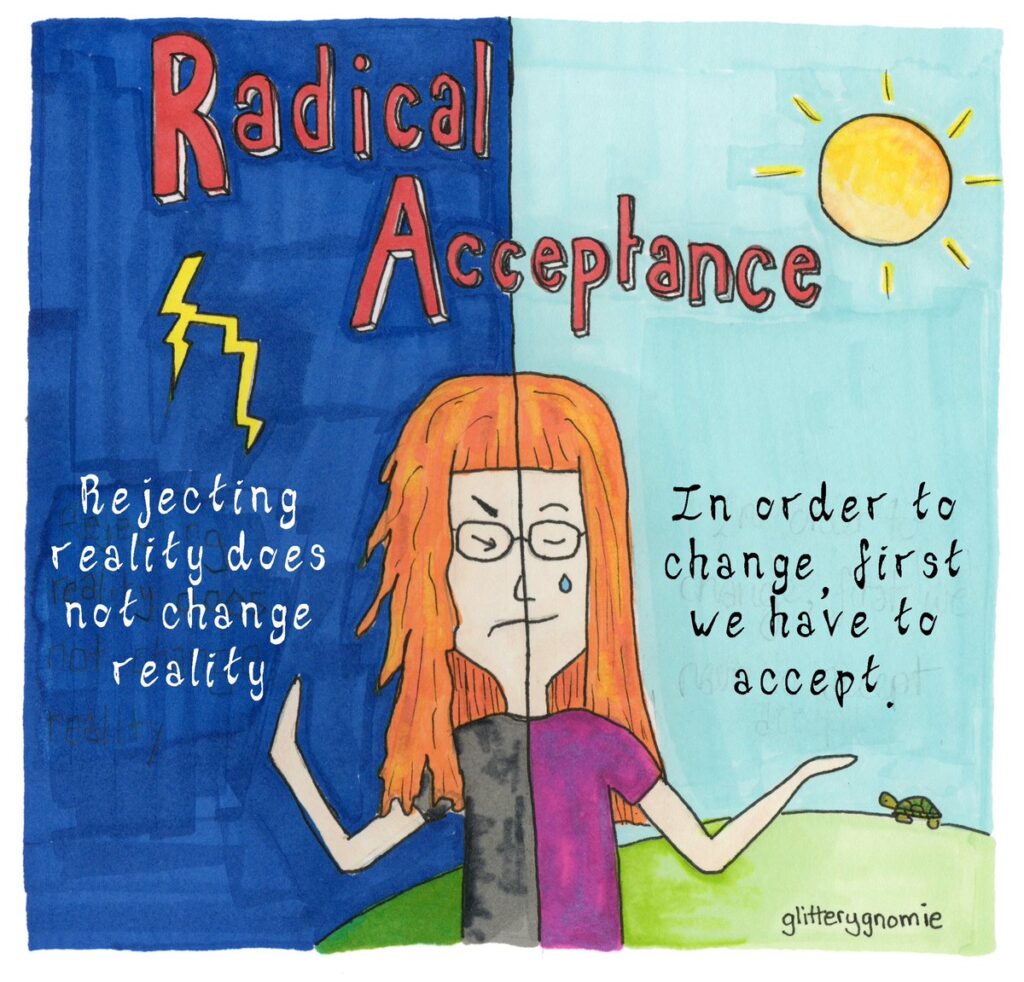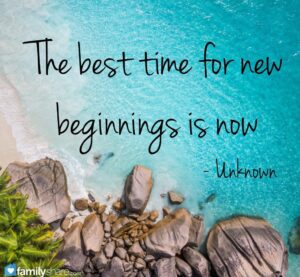So, this follows on from my last post wherein I mentioned “acceptance” and explored how this is important in therapy. Tara Brach talks about “radical acceptance”, the practice of acknowledging your experiences so you can be more present in the moment, learn to accept each moment as it comes—without judging our experiences or ourselves. She explains how we can use radical acceptance to live our lives more fully by always bringing our full attention to the present moment and accepting it for what it is. Radical acceptance does not mean self-indulgence or passivity, instead it empowers genuine change: healing fear and shame and helping to build loving, authentic relationships. It is based on the idea that suffering comes not directly from pain, but from one’s “attachment” to the pain or rather one’s attempts to avoid the pain, ignore it, wish it was something different and so on. It has its roots in Buddhism and the psychological paradigm put forth by Carl Rogers that acceptance is the first step towards change.
Radical acceptance is not an easy practice at all. In fact, it can require a lifetime of practice to truly get a handle on it. It is most often applied in situations when you are unable to fix or change what has happened or when something has happened that feels unfair, like the loss of a loved one or losing one’s job. While grief, disappointment anger and so on are normal emotions, suffering results when the initial pain is prolonged due to a lack of acceptance.

Rather than being attached to a painful past, radical acceptance suggests that non-attachment is the key to overcoming suffering. Non-attachment does not mean that we don’t feel our emotions, rather, it refers to an intention of not allowing pain to turn into suffering. This means mindfully watching your thoughts and feelings to identify when you are allowing yourself to feel worse than is necessary. The suspension of judgment that is an important part of radical acceptance does not mean that you have to approve of the situation, it involves accepting reality for what it is and not getting caught up in an emotional reaction to that reality. When we stop being at war with ourselves, we are free to live fully every precious moment of our lives.
Radical Acceptance is also a skill in Dialectical Behaviour Therapy (DBT) that helps people learn how to accept very painful events, people, or aspects of their life. It’s one of the skills found in the Distress Tolerance module of DBT. You can use the skill when you have trouble “getting over” or “moving on from” a painful or traumatic incident in the past or present, especially one that you had or have no control over. For example, someone might have done something to you that was extremely hurtful, and you don’t know how you’ll forgive them for it. Or you might have experienced a loss of a loved one, or a traumatic breakup and you cannot accept that such an event happened.
Radical acceptance is a complete acknowledgment of reality as it is in that precise moment. It means accepting that all these painful situations or aspects happened or are currently happening. It means deciding to accept the facts of what is happening now. This doesn’t necessarily mean that you must like the situation. It does not mean you endorse what happened. When you decide to radically accept a situation, that doesn’t mean you are choosing to forgive the person who wronged you (although you can choose to do this). There is no requirement for you to become friendly with them again; it does mean accepting – in your mind, heart and soul – that what happened actually happened. It means fully coming to terms with reality. It means realising and accepting that you cannot change the past, and that there not be a short-term solution for what’s happening in the present.
DBT founder Marsha Linehan said, “rejecting reality usually turns pain into suffering.” You may notice that you are having a hard time accepting reality if you feel like you are fighting a difficult event that happened (or is happening) or your mind keeps coming back to something excruciatingly painful that you had/have no control over. With radical acceptance, you embrace things as they are and this can help you cope with reality, reduce the impact of painful emotions and live your life.
Radical acceptance is not easy; indeed many clients find it extremely hard at least in the beginning. It requires you to accept your circumstances without judgment of yourself, the situation, or others. Accepting that the waiter brought you the wrong food while also raging at him for being stupid or careless is not radical acceptance. One of my favourite “mantras” that many of my clients will hear me say is “this too will pass”. Another is “it is what it is” which the mantra of radical acceptance. By repeating and believing this statement, you are releasing your expectations and your judgment of what happened. You can look upon it as turning to your higher power, your god(s) or the universe itself and saying “okay, this is what you’ve given me right now and I accept it.” Hold this mantra close to your heart and repeat it whenever anything happens that makes you want to run away from acceptance. Embracing the mantra will help you embrace the skill.
You do not have to like reality, but you do have to accept it because what other choice do you have?
Fighting reality does not change reality; it just increases your emotional suffering. Part of being human is experiencing pain. There’s no way around this. And it’s true that some people’s lives have more pain in them than others. But while pain is unavoidable, suffering is optional.
Pain + resistance = suffering
Pain + radical acceptance = peace
Resistance is putting demands on reality to be different than it is. It is getting angry, sad, frustrated etc., in big and small ways because the world is not doing what you want it to do. This doesn’t work, it is not effective; it just keeps you in a war with you. Or with the world. And you will not win, the universe doesn’t give one jot about you or me, it just “does its own thing”, it doesn’t have a notion that life must be fair, just or even pleasant, those are human values and not everyone shares your values.
The path out of suffering is to lay down your arms and imagine how your life would be if you said yes to whatever is happening instead of no, no, no. What would you do? Would you cry, scream, grieve? As you allow yourself to accept what has happened or what is happening you may well feel strong emotions, these often come with radical acceptance. But if you allow yourself to feel that strong emotion, to sit with it, it will eventually move through you. And when it does, calmness follows and very often, a deep peace. In that place of deep peace, all sorts of transformative things can happen.

Radical acceptance can be really helpful when used to help address large life-changing events such as trauma. These circumstances are the most challenging to accept. They are also some of the most important because they affect your life in such a profound way. It’s important to accept that what happened to you happened, there is no benefit to living in denial. What happened was not your fault, but it is unfortunately your task to live with the results of the trauma and therapy can help you to feel safe, to open your mind to accept that the event happened to you. Another part of radically accepting trauma is accepting that you can still have a life worth living, not despite but including what happened to you. It is part of your story. Just a part, though it affects much more than that. You can still build and live a life that you value even though that thing happened to you. It need not ruin your life.
You may see possibilities of moving forward that you couldn’t see before. You may forgive yourself.
How would your life be different if you stopped fighting reality?
A final but very important point: acceptance does not mean unquestioning passivity or quietism, it does not mean you have to be a doormat. In the previous post I talked about the paradoxical theory of change, the idea that before you can change you have to accept who and where you are in this moment. People come to therapy to change, not just to accept how they are in this moment. More about that in the next post.






